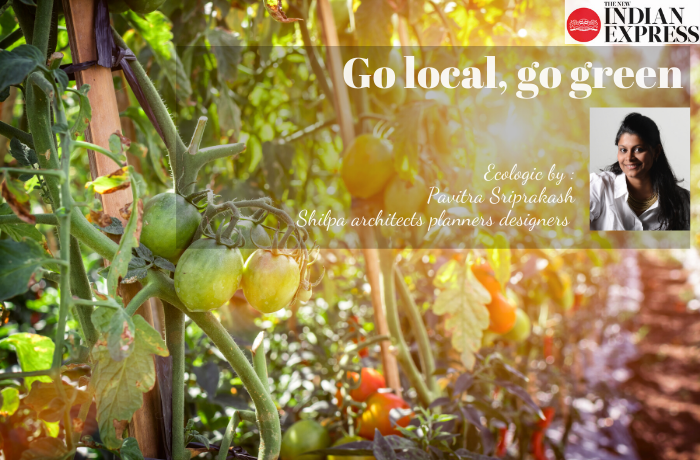04-Dec-2019 : Pavitra Sriprakash, Director and Chief Designer at Shilpa Architects Planners Designers writes a weekly column on Sustainability for The New Indian Express titled “ECOLOGIC”. This week she writes about the benefits of buying organic/local produce.
Full article below: (Also available at The New Indian Express Website)
Go local, go green
Food accounts for 48 per cent of the environmental impacts on land and 70 per cent on water resources. This covers dairy, meat and other processed food all of which are increasing rapidly as countries develop and incomes rise. When it comes to sustainable food, there are aspects of it that range from agriculture, distribution, transportation, preservation and of course, organic farming.
Typical agricultural practices can have ramifications on the land and environment through declining water tables, chemical leaching, chemical runoff, soil erosion, land degradation, loss in biodiversity, and other ecological concerns. The answer seemingly lies in local, seasonal and organic farming techniques which address these issues. A sustainable means of acquiring food is to purchase locally, seasonally grown fruits and vegetables.
Doing so minimises the carbon footprint by optimising transport as well. Local, small-scale farming operations typically utilise more sustainable methods of agriculture than conventional farming systems. Decreased tillage, nutrient cycling, fostered biodiversity and reduced chemical pesticide and fertiliser applications all contribute positively to the environment. These vegetables and fruits are also grown and harvested within their suitable growing season. Local, seasonal produce is typically fresher, unprocessed and therefore proves to be more nutritious. It won’t require chemicals for preservation or plastic wrapping which is usually the case for long-distance shipping and handling of produce.
Organic farming is a rapidly emerging trend in the sustainable food industry. As per the definition of the United States Department of Agriculture (USDA), “organic farming is a system which avoids or largely excludes the use of synthetic inputs (such as fertilisers, pesticides, hormones, feed additives etc) and to the maximum extent feasible rely upon crop rotations, crop residues, animal manures, off-farm organic waste and biological system of nutrient mobilization and plant protection”.
It is described as an ecological production management system that promotes and enhances biodiversity, biological cycles, and biological activity in the soil. Techniques such as crop rotation, compost, green manure and biological pest control all are part of the organic farming framework. While it can be argued that farming in India has historically been organic, it is safe to say that a majority of the produce in the country today contains some form of manufactured fertilisers, pesticides and that most dairy contains growth hormones in it.
But what truly is the impact of your food choices on the environment? We have to realise that every time we decide to buy any product — we are actually voting for a larger cause. We are affirming that as a consumer we want to buy organic produce. This may cost us more today, but by voting to buy that over the regular stuff we are encouraging the farming of more organic produce.
We are sending the message to the market that there is a need for more such produce. In fact, we are setting up the supply and demand for organic, local and seasonal produce. We must be aware of where our food comes from, how it is grown and harvested. When it comes to eating healthy and keeping the planet safe at the same time, think local, seasonal and organic for your home and family, these are made on the planet and consumed by our bodies, and we need the health of both in order to be holistically healthy.



